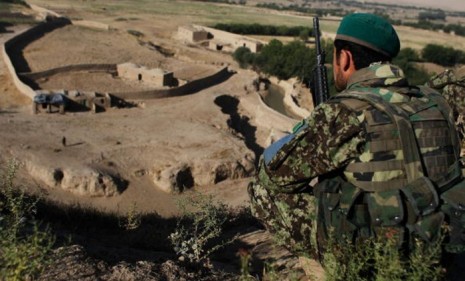Is a Taliban peace deal possible?
Afghan President Hamid Karzai's government is exploring reconciliation with the Taliban, but both the U.S. and the Afghan people are skeptical

With the U.S. planning to start withdrawing troops from Afghanistan next year, the Afghan government of President Hamid Karzai is pushing to strike a deal with Taliban insurgent leaders. Pakistan's military and intelligence service, which has old ties to the Islamist group that once ran Afghanistan, supports the reconciliation bid, but many in Afghanistan say any power-sharing arrangement with the Taliban is a formula for disaster, and CIA Director Leon Panetta said he has seen "no evidence" Taliban fighters will lay down their arms. Is there really any chance of reconciliation in Afghanistan? (Watch an al Jazeera report on Karzai's meetings)
The U.S. should get behind this effort: The Obama administration's "continued reluctance" to "embrace the possibility of political reconciliation with the Taliban just makes no sense," says Michael Cohen at Democracy Arsenal. If, as the White House says, al Qaeda has been weakened, now would be the perfect time to "publicly float the idea that we can accept a political role for the Taliban as long as they don't allow any al Qaeda safe haven."
"What's our End Game for Afghanistan?"
The Week
Escape your echo chamber. Get the facts behind the news, plus analysis from multiple perspectives.

Sign up for The Week's Free Newsletters
From our morning news briefing to a weekly Good News Newsletter, get the best of The Week delivered directly to your inbox.
From our morning news briefing to a weekly Good News Newsletter, get the best of The Week delivered directly to your inbox.
There's no such thing as a "good" Taliban: Obama has good reason to be skeptical of "Pakistan's good Taliban theory," say the editors of the Times of India. The Taliban have a vision of Afghanistan's future that is incompatible with what the U.S. and the Afghan people want. Even if some Taliban militants aren't as hard-core as others, any kind of deal that depends on the willingness of Islamist radicals to work within somebody else's rules is "dangerous."
"U.S. finally realizes there’s nothing called good Taliban, gets cautious"
In the short term, "reconciliation" means more intense fighting: "Each side wants to bargain from a position of maximum strength," says David Ignatius in The Washington Post, "and for the foreseeable future that means trying to inflict maximum pain." In the Pashtun culture, reconciliation is only possible when there is "a gundi, or balance of power, that conveys mutual respect and security." So far, that's not in sight.
"What would reconciliation look like for the U.S. and Taliban?"
A free daily email with the biggest news stories of the day – and the best features from TheWeek.com
-
 Has Zohran Mamdani shown the Democrats how to win again?
Has Zohran Mamdani shown the Democrats how to win again?Today’s Big Question New York City mayoral election touted as victory for left-wing populists but moderate centrist wins elsewhere present more complex path for Democratic Party
-
 Millions turn out for anti-Trump ‘No Kings’ rallies
Millions turn out for anti-Trump ‘No Kings’ ralliesSpeed Read An estimated 7 million people participated, 2 million more than at the first ‘No Kings’ protest in June
-
 Ghislaine Maxwell: angling for a Trump pardon
Ghislaine Maxwell: angling for a Trump pardonTalking Point Convicted sex trafficker's testimony could shed new light on president's links to Jeffrey Epstein
-
 The last words and final moments of 40 presidents
The last words and final moments of 40 presidentsThe Explainer Some are eloquent quotes worthy of the holders of the highest office in the nation, and others... aren't
-
 The JFK files: the truth at last?
The JFK files: the truth at last?In The Spotlight More than 64,000 previously classified documents relating the 1963 assassination of John F. Kennedy have been released by the Trump administration
-
 'Seriously, not literally': how should the world take Donald Trump?
'Seriously, not literally': how should the world take Donald Trump?Today's big question White House rhetoric and reality look likely to become increasingly blurred
-
 Will Trump's 'madman' strategy pay off?
Will Trump's 'madman' strategy pay off?Today's Big Question Incoming US president likes to seem unpredictable but, this time round, world leaders could be wise to his playbook
-
 Democrats vs. Republicans: who are US billionaires backing?
Democrats vs. Republicans: who are US billionaires backing?The Explainer Younger tech titans join 'boys' club throwing money and support' behind President Trump, while older plutocrats quietly rebuke new administration


